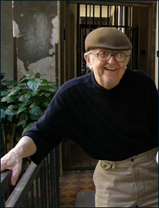
 |
Retired English teacher Thomas Weisshaus (WCAS57) recently published his first book, Not a Victim! Tales of Survival in Nazi Budapest, which recounts his survival during the Nazi occupation of Hungary in 1944. An 83-year-old Exeter, N.H., resident, Weisshaus told Northwestern magazine’s Mike Cullity about his life and why sharing his Holocaust experience is important.
Where does your story begin?
I was born in Budapest in 1928 and grew up in a middle-class district. I lived in an apartment building with my parents, Sándor and Erzsébet, my older brother, Endre, and my maternal grandparents.

Thomas Weisshaus in Budapest in 2009
How did the Holocaust first touch your family?
In November 1942 the Hungarian government called my father into the labor service and sent him into forced labor in the Ukraine. At the time, Hungary was an ally of Germany in attacking the Soviet Union, and the labor service was devised to get Jewish men out of circulation by sending them to be slaves, really, behind the German lines. By February 1943 he was dead. He was 42 years old.
Where were you when the Nazis invaded and occupied Hungary on March 19, 1944?
I was at a jazz concert with friends in Budapest, and by the time we came out, the streets were full of German soldiers, tanks and trucks. The Nazis forced all the Jews in Budapest to live in designated buildings, but ours was declared a Jewish building, so we didn’t have to move.
In October 1944 the Nazis installed a Hungarian government dominated by the fascist Arrow Cross Party. What happened to you after the coup?
These thugs came to our building and marched all the men aged 16 to 55 out of town. I was with my 55-year-old uncle, Laszlo, and we were forced to dig ditches outside Budapest for several weeks. In November they marched us to Csepel Island, which is south of the city along the Danube, where we were ordered to wait with thousands of other Jewish men. Along the river’s western shore, there were trains filling up with men from the island and heading north toward Germany and Austria.
How did you avoid deportation on the trains?
After we were on the island for three days, I heard a soldier calling my uncle’s name. He took us to see an officer, who yelled at my uncle in Hungarian, “How did you find such a woman?” He ordered the soldier to take us to a streetcar heading back into the city. We found out later that my Aunt Mariska, my mother’s sister and Laszlo’s wife, went into that camp, talked to an officer and got us out. I never found out what she did to win our freedom; the only thing she ever said about it was that they threw her into a dark dungeon before letting her go.
What happened after you were reunited with your family?
My mother took me to see Swedish diplomat Raoul Wallenberg, who gave me a Swedish passport and put me in a safe house one block from the Danube. My mother, grandmother, Aunt Olga and Cousin Judith got false identity papers and leased an apartment in a Christian building. My mother brought me food every few days, but in late December 1944 she stopped coming. When I went to her building, I found out that the night before all four women had been picked up by a truck. I had heard gunshots and seen blood on snow and ice in the Danube, so I knew the Arrow Cross militia was killing people. I don’t know what happened to my family members, but my guess is that they were among those shot into the river. [The militia handcuffed people together, attached weights and then shot them on the bridges over the Danube, so the victims fell into the river.]
How did you escape Budapest?
When I found out my family was gone, I escaped over to the Russians, who were only a couple of blocks away. After the war ended in 1945, I left Hungary with help from a group of Israelis and lived for most of 1946 in a displaced persons camp in Germany, waiting to go to Israel. But the U.S. Congress passed a law that said if you were under 18 and an orphan because of the Holocaust, you could apply for a passport. I applied and was approved and sailed into New York Harbor on Jan. 7, 1947.
For many years you never spoke publicly of your Holocaust experiences. What prompted you to open up?
In 2003 my wife, Patricia, and I went to see a play called Under a Yellow Star at a middle school in Nottingham, N.H. The students read from journals that children of the Holocaust had left behind. At the intermission I met the director, Anne Sheehan, and she invited me onstage after the show to share my experiences and answer questions. I began speaking at other schools, and the stories I shared became the basis for my book.
Why do you feel it’s important to tell your story?
I tell kids in schools that if you listen to a witness, you become a witness yourself. Obviously all of us witnesses will be gone soon. If we can find young people who feel like going on with the story, then we’ll have witnesses going forward. That has become a very important motivation for me.
For more on Weisshaus’ book, Not a Victim!, visit www.notavictim.net.
Mike Cullity (GJ95) is a reporter for the New Hampshire Union Leader and a freelance writer. He has written for the alumni magazines of Seton Hall University, the University of Wisconsin, the University of Southern California and Southern New Hampshire University.
Tell us what you think. Email comments or questions to the editors at letters@northwestern.edu.